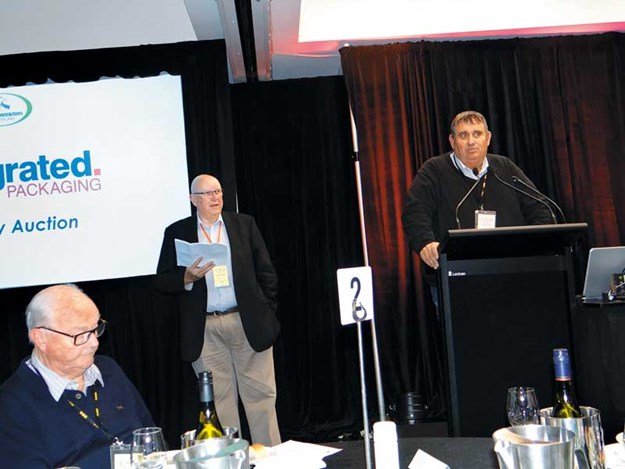RCNZ conference: Good Yarns workshop
Increasing isolation for farmers is being seen – and now addressed – by rural contractors
Otago rural contractor Reid Gare was one of those attending a Good Yarns workshop at the RCNZ conference. Good Yarns is an evidence-based, peer-delivered, mental health literacy programme for workplaces, both rural and urban, that enables people to talk about mental health.
 |
|
Integrated Packaging sales manager Kim Harris announced a $3000 donation to the Rural Support Trust at the RCNZ conference
|
Reid says his staff often comments on the amount of time he spends talking to farmers. "Farmers and contractors both face a lot of time working alone. A lot of farmers love to have a yarn. I see that as just a part of my job or call it PR."
He says contractors have to be careful as not everyone wants to talk and they can be masking range of emotions, though sometimes the signals are there that all is not well.
"I’ve seen guys react to some situations in the strangest of ways that always raises alarm bells for me."
Rural Contractors NZ vice president Helen Slattery led the Good Yarns workshop at last month’s Rural Contractors conference. Helen trained as a Good Yarns facilitator after the loss of a family member due to suicide.
"These things are happening too often in rural communities. Farmers can become isolated. As rural contractors, we’re often the only person that they might see during the day. It’s important for them to have someone to yak to."
Conference sponsor Integrated Packaging’s sales manager Kim Harris said contractors were themselves working in a highly stressful environment and should also keep an eye on each other. Integrated Packaging announced a $3000 donation to the Rural Support Trust at the RCNZ conference
Helen says one place farmers used to be able to talk were country pubs. "Unfortunately, there are fewer and fewer of these, so farmers don’t get the same chance to meet mates and neighbours. Even for those who still have a pub within cooee face the realities of tougher drink driving laws."
Reid Gare says it’s not just the loss of country pubs that’s causing more farmers to be isolated. With many farming wives and partners now working off-farm for both economic and social reasons, there was much less opportunity for partner-to-partner contact through the day.
"Sometimes farmers don’t go in for smoko and keep working. By the time the partner gets home, they are both tired and there’s less chance to talk."
Helen says rural contractors have to be prepared to encounter a range of emotions when talking to farmers who may be facing some difficult times.
"You can encounter anger, sullenness, someone who is withdrawn or highly animated. We are not trained counsellors. All we do is provide an opportunity to talk."
In extreme situations where there may be a risk to life, the advice is to stay with the person but to call for help from an agency like Rural Support Trust or even police.
Support is available
- Rural Support Trust: 0800 787 254 rural-support.org.nz 50800
- Depression helpline: 0800 11575
- Lifeline: 0800 542 11757 24/7 phone advice
- Need to talk? Text 1737 for a service staffed 24/7 by mental health professionals.
Find farm machinery for sale in NZ
Keep up to date in the industry by signing up to Farm Trader's free newsletter or liking us on Facebook


.jpg)
.jpeg)

.jpg)
.jpeg)
.jpg)
.jpeg)
.jpeg)







